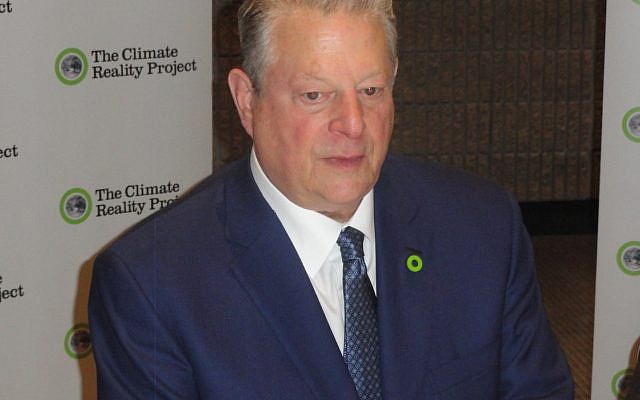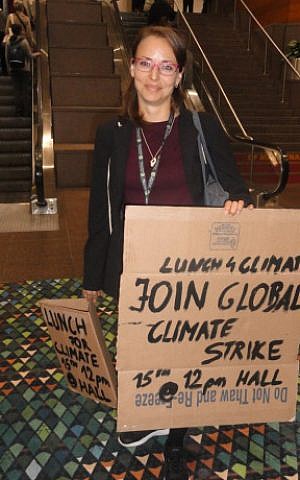Al Gore: Youth Essential to Climate Change Action
Young people are getting attention from political leaders while challenging public policy on saving the planet.
Kevin Madigan is a senior reporter for the Atlanta Jewish Times.

A walkout by school students to protest government inaction on climate change took place March 15 on a global scale, spearheaded by Swedish teen activist Greta Thunberg.
“We school strike for the climate in 1769 places in 112 countries around the world. And counting,” Thunberg wrote on Twitter. “Everyone is welcome. Everyone is needed. Let’s change history. And let’s never stop for as long as it takes.”
On the same day, Thunberg, 16, was nominated for a Nobel Peace Prize for her efforts and earned praise from former U.S. Vice President Al Gore, founder and chairman of The Climate Reality Project, during its activist training conference March 14 in Atlanta.
“Just as in the civil rights movement, young people have played an absolutely essential role at key moments, and that’s true with climate change,” Gore said in a private meeting at the conference with the Atlanta Jewish Times and four other local publications.
But are they doing enough? “My impression is they definitely are. Young people in both parties have contributed to this,” he said, giving an example: “About a dozen college Republican clubs announced they had communicated with the Republican National Committee and told them if they didn’t change their position on climate change, they were going to lose their votes.”
Thunberg’s native country is showing the rest of the world how to address the climate issue, Gore said. “Several of the Nordic countries have gotten a head start on reducing emissions. Some have a lot of hydro, which makes it a little easier for them, but they do an excellent job, Sweden in particular. Also, the Himalayan nation of Bhutan.”
The biggest pollution emitters are China, the United States, India and the European Union. “None of those four are at the same level that countries, such as Sweden, are.”

What advice would he give the next generation of leaders? “What’s going on in the public square right now is more important than at any time since the Civil War,” Gore responded.
“We are facing an ecological crisis that could bring about the end of human civilization, and if you’re a college student, now is the time to equip yourself to be a part of this struggle. It is connected to the struggle against voter suppression, the struggle for economic justice and equality of opportunity, to a sensible policy toward immigrants and toward foreign policy.”
In 1990, Gore and Georgia congressman John Lewis sponsored the first environmental justice legislation in the House of Representatives but were unable to get a majority to pass it.
“When I became vice president, I was able to persuade President Clinton to enact it as an executive order, and it’s still on the books. I assume President Trump hasn’t found it,” he said.
The Green New Deal, recently initiated by Democratic congresswoman Alexandria Ocasio-Cortez, 29, aims to address the issues of climate change and economic inequality, but faces a few hurdles before enaction. “I see it as an aspirational statement that gives people an opportunity to declare their intentions toward the climate crisis and the need to create new jobs, so, on that basis, I support it,” Gore said.
He compared the Green New Deal to the nuclear freeze proposal, which he worked on as a U.S. Senator in the early 1980s. “Experts can quibble about what’s in it and not in it; it serves as a vehicle for the vast majority of the American people to say ‘we get it, the crisis is for real, we’ve got to fix it.’ The fastest growing jobs are in solar and wind, so we can create jobs while we solve the climate crisis, but we need the politicians on board.”
On the other side of the aisle, Gore sees a bit of hope for the future. “I think we are crossing an important political tipping point right now.” He cited a number of conservative Republican members of Congress, business leaders and former Cabinet members who have spoken out in support of action to save climate balance, as well as some op-ed columns that signal changes on the part of many Republicans.
“We are not where we need to be, but we are moving in the right direction.”



comments